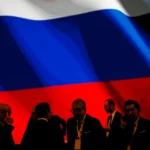On Sunday, September 28, Moldova votes for a new parliament—and, in effect, for the country’s direction: continue toward the EU or pivot to Moscow. According to Bloomberg, which reviewed internal documents, the Kremlin approved a multi-pronged plan this spring to shape the outcome, aiming to weaken President Maia Sandu’s Party of Action and Solidarity (PAS) and ultimately force her from power. The outlet stresses it couldn’t verify the execution of every item, yet two European officials described the plan’s implementation as “almost inevitable.”
What’s in the “plan”: diaspora mobilization, street pressure, and a content factory
Based on the documents cited by Bloomberg, the core idea is to dilute and redirect PAS’s support while preserving the appearance of a competitive contest. Four main tools are outlined:
- Diaspora as leverage. Recruit Moldovans living abroad (including those in Russia), pay for travel to polling stations across the EU and beyond. Diaspora votes proved pivotal in 2024; the new effort seeks to manage them in a targeted way.
- The street as an amplifier. Deploy prepared groups—including young men from sports clubs and criminal networks—for provocations on election day and afterward. If PAS loses: demand Sandu’s resignation. If PAS wins: cast doubt on the result as tainted.
- Mass disinformation. Telegram networks, TikTok, Facebook, call centers and “traditional” channels push the line that Sandu is a foreign puppet driving the country toward misery and war.
- Administrative pressure. Use “kompromat” to disrupt and slow the electoral process by pressuring public officials.
Chișinău, for its part, is stepping up countermeasures: police requested the blocking of 443 TikTok channels, reported action against vote-buying schemes, and on September 16 seized 5 million lei (about $302,000) in a case involving illegal cash imports to fund parties and purchase votes. The Kremlin didn’t respond to Bloomberg’s request for comment; Russian agencies routinely say they do not interfere in foreign elections and label such claims “Russophobia.”
The stakes: the EU course vs. a “turn to Moscow,” money, and regional precedents
Moldova is a small country between Ukraine and EU/NATO member Romania, with a significant Russophone minority, the breakaway region of Transnistria (under de facto occupation according to the Council of Europe), and a recent conviction in Gagauzia over Russian financing of a political party. On the line: either accelerating European integration (PAS vows to move accession talks and unlock funding) or pausing and drifting toward Moscow. The EU is visibly “putting its shoulder to the wheel”: in late August, Emmanuel Macron, Friedrich Merz, and Donald Tusk visited Chisinau. Yet polls suggest PAS could lose its parliamentary majority, pointing to a complicated coalition map.
Money is a key tell. Sandu told European lawmakers that Russia spent about 1% of Moldova’s GDP—roughly €150 million ($178 million)—to influence last year’s EU referendum and her re-election. European officials cited by Bloomberg deem it highly likely that similar sums have been earmarked for this cycle. The regional backdrop shows the playbook at work: in Georgia, last year’s vote drew interference allegations and sparked prolonged protests; in Romania, judges ordered a re-run after claims of a “Russian trail” that had vaulted a fringe far-right candidate into first-round victory. On September 16, Romania’s chief prosecutor Alex Florența said a months-long probe found a hybrid campaign dating back to 2022: four companies with Russian ties ran fake accounts and AI bots reaching at least 1.3 million citizens.
Chișinău’s rhetoric is blunt. As President Sandu put it on September 9 in Strasbourg:
“The Kremlin’s goal is clear: to capture Moldova through the ballot box, to use us against Ukraine and to turn our country into a launchpad for hybrid attacks on the European Union. That is why this election is very important. By defending it, we protect not only Moldova, but also regional security and stability.”
The opposition, the “shadow of messages,” and the fight over legitimacy
On the field are the “nominally pro-EU” Alternative bloc and a pro-Russian camp led by Igor Dodon. A separate batch of documents reviewed by Bloomberg describes hundreds of messages between Dodon and a senior Moldovan intelligence officer from October 2019 to May 2021: requests and responses covered flight manifests, border crossings, meetings—not only about opponents like Sandu, but also fellow pro-Russian figures and certain foreign embassies.
Dodon rejects any wrongdoing:
“As to the regards of my cooperation with state institutions, it has always been in the public interest, not for political or personal reasons… As the head of state, I acted solely within the bounds of the law and in the national interest.”
In an “open letter,” he accuses the authorities of illegally pressuring the opposition:
“The ruling regime in Moldova is actively using administrative resources not only to pursue its political goals but also to intimidate its main competitors.”
Bloomberg adds that in February 2020 Dodon sought information on a person whom, he said, “eastern partners” insisted should sit on the security council; two months later—amid a dispute over grain shipments from Transnistria—he demanded updates, noting that “the Russians are writing to me.”
Bottom line. Three vectors are colliding in Moldova: European integration, backed by EU political and financial support; a pro-Russian strategy relying on street and online tactics plus targeted administrative pressure; and internal competition among opposition groups for the mantle of “Moscow’s preferred partner.” September 28 will test not only PAS, but the resilience of institutions—from police work to society’s ability to distinguish genuine competition from a constructed semblance of it.
This article was prepared based on materials published by Bloomberg. The author does not claim authorship of the original text but presents their interpretation of the content for informational purposes.
The original article can be found at the following link: Bloomberg.
All rights to the original text belong to Bloomberg.


















